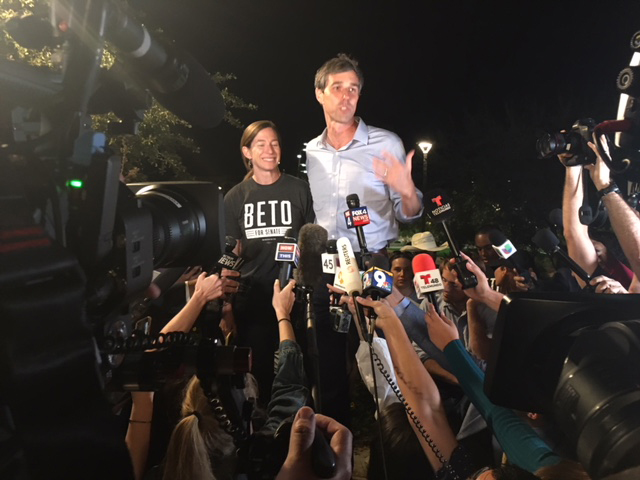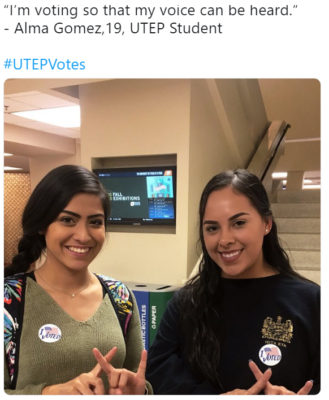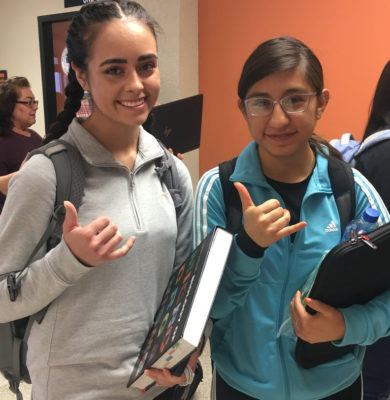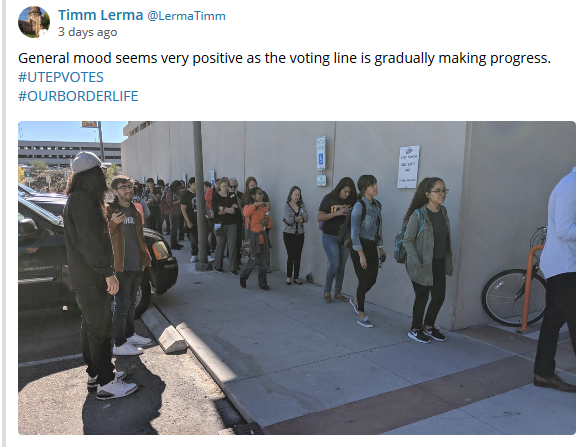Voters under age 30 are playing an increasingly crucial role in El Paso County elections, a sign that younger Latinos are becoming more engaged in the political process in the Donald Trump era.
Voters under age 30 accounted for almost 17 percent of El Paso voters in the 2018 midterm election, up from 8 percent in the 2014 midterm. Put another way, more than one in every six voters in El Paso this year was under age 30, compared to one in 13 in 2014.
Related story: Here’s what the young voter surge looked like at UT El Paso
The 2018 election featured an El Pasoan, Democratic Senate candidate Beto O’Rourke, at the top of a statewide ticket for the first time in Texas history. O’Rourke’s presence, combined with President Trump’s deep unpopularity among Latino voters, led to El Paso more than doubling its turnout between midterm elections, going from 82,000 in 2014 to 203,000 in 2018.

El Pasoan Beto O’Rourke’s run for the U.S. Senate and anti-Trump sentiment among Latinos helped drive El Paso to more than doubling its turnout between midterm elections. Photo courtesy Robert Moore
The number of voters under 30 grew fivefold between those elections, going from 6,500 in 2014 to 34,000 in the recent election, an analysis of county elections records shows.
This year marked the second consecutive general election where younger El Paso voters increased their influence.
In the 2016 presidential election between Democrat Hillary Clinton and Trump, voters under 30 accounted for almost 17 percent of El Paso voters, up from 14 percent in the 2012 race between Democrat Barack Obama and Republican Mitt Romney. The number of under-30 voters jumped from just over 25,000 in 2012 to more than 36,000 in 2016.
El Paso County elections data doesn’t include reliable information on voter ethnicity, so it’s difficult to determine precisely how much of the vote is coming from Latinos. But census data shows that 82 percent of El Pasoans 18-29 are Latino, so it is safe to assume that Latinos are driving the surge in younger voters.

Photo by Maria Gutierrez via Twitter for Borderzine.com
These younger voters are helping to turn El Paso, long a Democratic stronghold, an even deeper shade of blue. O’Rourke won 74 percent of his hometown vote this year and Democratic gubernatorial nominee Lupe Valdez won 67 percent in El Paso. In the 2014, the Democratic Senate and governor candidates won 54 percent and 60 percent, respectively, of the El Paso vote.
Clinton won 68 percent of the vote in El Paso in 2016, up from Obama’s 65 percent in 2012.
Even as a Democratic stronghold, El Paso has regularly elected Republicans to offices like state representative, county commissioner and justice of the peace. But after this year’s election, El Paso has no Republicans in any partisan elected office in the county. (Republican U.S. Rep. Will Hurd, who represents a small part of El Paso County in a district that stretches to San Antonio, had a slight lead in his race against Democrat Gina Ortiz Jones. Hurd received 19 percent of the El Paso vote.)
Despite the huge gains in the numbers of younger voters, more growth is possible because voters under 30 continue to turn out at rates far below other age groups. That’s true nationally and has been true for generations. Just over 44 percent of all El Paso County registered voters cast ballots in the 2018; 31 percent of registered voters under 30 came out to vote. That was up from 7 percent turnout for under-30 voters in 2014.
In the 2016 presidential election, 35 percent of under-30 registered voters in El Paso County cast ballots, up from 31 percent in 2012.

First time voters waiting in line for more than an hour at the UTEP mobile voting station. Photo by Maria Gutierrez, Borderzine.com
In covering the election for El Paso’s ABC-7, the Washington Post and Texas Monthly, I interviewed a number of younger voters, many casting their first ballot ever. Two common themes emerged in those interviews: excitement about O’Rourke’s candidacy, and concern about the status of Latinos in the age of Trump. Those concerns often overlapped, with younger voters seeing O’Rourke as the antidote to Trumpism. Here is some of what I heard:
Alexandria Urbina,18, freshman at the University of Texas at El Paso: “This election is Texas’ chance to vote out incumbents who’ve done little to progress our great state and have in fact pushed for legislation which is retrogressive in the way of women’s health, transgender rights, and gun control to name a few. These hot issues, which are expressly meaningful to millennials and Gen X, makes it all the more critical for young voters to take action by getting to the polls and making informed votes for the future of Texas.”
Brianna Moreno, 23, graduate student at New Mexico State University: “I am motivated to vote in this election because there is a candidate, Beto O’Rourke, who I have met personally and I feel greatly represents mine and my family’s ideals. I will always back the candidate that prioritizes human rights and I believe his effort is genuine. I vote any time I can because voting locally will hopefully influence who our future leaders are. I voted in the 2016 election for the first time. It was my first experience being more politically involved and unfortunately, my presidential candidate choice lost the election.”
Diego Gomez, 18, a senior at Americas High School: “I just want my young views, especially with immigration and things that apply to my family as a Mexican-American, to be embraced. I think a lot of us feel very unheard.”
Garrett Cunningham, 21, a student at Washington University in St. Louis who voted by mail: “This year, voting is especially important because our core values, norms, and pillars of democracy have been continually threatened by the current administration. More specifically, I am choosing to vote in my hometown instead of my college town because El Paso and Texas have an extraordinary opportunity in Beto O’Rourke’s candidacy. For too long El Paso has been neglected in state and national politics. Having a prominent, national voice for El Paso would be great for our community.”
Ilse Adame, 19, a student student at the University of San Diego who flew back to El Paso to cast a ballot during early voting because she had missed the deadline to do a mail ballot. “This was really important to me and dear to my heart because it’s my first time voting and I felt that this election is one of the most important Senate races in America and I really wanted to make my voice heard. People can protest and rally all they want, and that’s great, but your voice doesn’t really make a change unless you vote.”
Gilberto Manuel Seañez Hernandez, 18, an El Paso High School senior: “As a Mexican-American it’s important for me to vote because I don’t want future generations to think that Donald Trump was a good person for our country, that a Mexican-American or Mexican could not have any opportunity in the United States. My family lives in Mexico, I live alone in the United States, in El Paso, and I hope that one day we will be together as a family in the States. I don’t want to see them behind the wall.”



